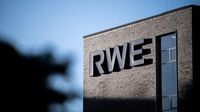RWE AG, Germany's leading electricity producer, recently announced a cautious outlook for the coming years, revealing that their earnings targets for 2025 are set to be weaker than analysts initially expected. This revelation surfaces amidst a backdrop of rising global uncertainties that have prompted the energy giant to scale back its investment plans significantly.
On March 20, 2025, during a press briefing held in Essen, CEO Markus Krebber disclosed that while RWE achieved better-than-anticipated results in 2024, they now project an operational profit for 2025 to be between €4.55 billion and €5.15 billion, less than previously forecasted.
The company has decided to trim its investments to €35 billion over the span of 2025 to 2030, which marks a downward revision of €10 billion from earlier plans. The adjustments reflect a strategy aimed at navigating through heightened geopolitical tensions, supply chain disruptions, and increasing interest rates that are expected to impose strain on operational realities.
"Wir wollen auch weiterhin sicher Geld verdienen," Krebber stated, underscoring the imperative for RWE to ensure it can continue generating stable returns despite a shifting landscape. In 2024, RWE experienced a significant decline in adjusted earnings before interest, taxes, and depreciation, which fell more than 25% to approximately €5.7 billion, better than the anticipated drop to around €5.5 billion projected by analysts.
The root causes listed by RWE for this more conservative financial outlook include enhanced uncertainties related to market conditions, alongside the aforementioned supply chain bottlenecks and geopolitical risks that have exacerbated the cost of capital and investment. According to the report, "Die für 2025 ausgegebenen Ergebnisziele fallen schwächer aus als von Experten erwartet."
Despite these challenges, RWE's performance in renewable energy sectors has been notably strong. The conglomerate invested around €10 billion last year in various projects concerning wind farms, solar plants, battery storage, and electrolyzers. Noteworthy accomplishments include the commissioning of new generating plants with a combined capacity of nearly two gigawatts. Additionally, the company reported a record electricity production from renewable resources, which hit almost 50 terawatt hours in 2024.
In comparison, Germany produced an overall total of 256 terawatt hours of electricity from renewable sources throughout the year. This positions RWE in a leading role in the transition towards greener energy, as they operate renewable facilities primarily across the USA, the UK, Germany, and the Netherlands. As such, RWE's commitment to sustainable practices remains intact, even as they tighten financial reins.
Looking ahead to 2025, RWE acknowledged that the rising return requirements for new projects will also contribute to their altered investment strategy, with the expected threshold rising from 8% to 8.5%. This strategic pivot illustrates a significant adjustment as the company prepares for persistent market volatility and regulatory hurdles.
As the old adage goes, adaptability is key for survival in evolving markets. By realigning their investment focus and reinforcing their operational strategies, RWE looks to maintain stability amid these turbulent times. The conclusion of the year 2024, marked by a performance exceeding the pessimistic forecast, provides a silver lining, suggesting that with prudent future planning, RWE can weather the financial storms ahead and continue contributing to Germany’s energy landscape.
This commitment to reshaping investment in light of uncertainties cements RWE’s position as a robust player in the energy sector. Despite a billion-euro profit, the paradigm shift in its investment strategy demonstrates a pragmatic approach aimed at ensuring sustainable growth in a precarious economic climate.







